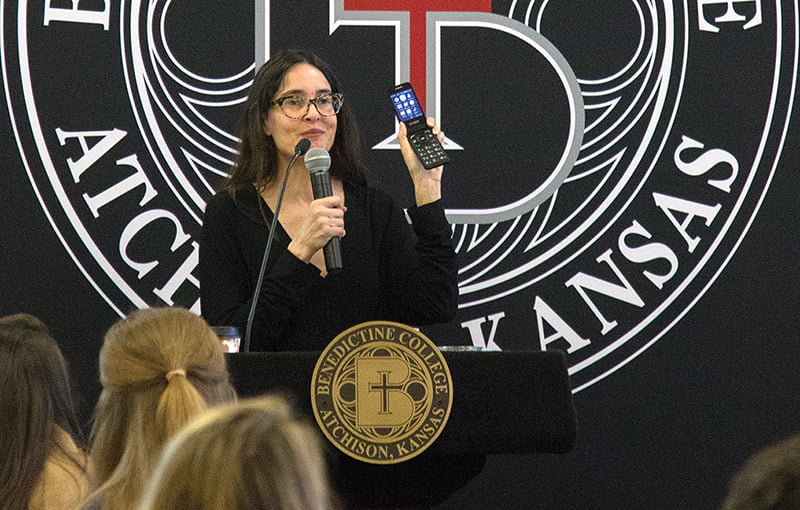
by Olivia Martin
olivia.martin@theleaven.org
ATCHISON — What does it mean to have a healthy relationship with technology? With social media? With smartphones?
These questions were central to the eighth annual Symposium on Advancing the New Evangelization at Benedictine College held March 29 and 30. The symposium’s theme was: “Technology and the Human Person.”
According to Dr. Donna Freitas, a sociologist, author and keynote speaker, questions about technology are some of the most important questions people can ask themselves at this moment in history.
And they are some of the most infrequent.
“We are not raising kids to ask [those] questions,” said Freitas. “I’m like the first person to ask my college students.”
Claire Wright, a junior theology and evangelization youth ministry student at Benedictine, agreed.
“I think this topic is one of the most relevant today,” she said. “Technology is everywhere, and no one knows what to do with it, especially in the church. But we can’t ignore it. It’s necessary to talk about it.”
Freitas is also the author of “The Happiness Effect,” a book for which she surveyed college students across the country for two years about their social media and smartphone use.
“I didn’t go in asking a bunch of questions about happiness,” said Freitas. “But I could ask them just about anything and happiness would come up.”
Freitas noticed in her study that there was a correspondence between high levels of a student’s social media and smartphone use and low levels of perceived happiness.
“[Students] spend their lives trying to navigate their obsession with [smartphones], their addiction,” she said. “There was a collective sense that we are being used by our devices and social media.”
Freitas went on to explain that the church holds the best response.
“We need to become critical thinkers about our devices,” she said. “One of the things that the Catholic tradition does amazingly well is it gives us reason to pause, stop, to contemplate — to just be without all the noise.
“What an interruptive opportunity the Catholic Church is!”
The theme of technology and the human person also represented for Brother Angelus Atkinson, a novice at St. Benedict’s Abbey in Atchison, the value the church brings to questions about technology.
Brother Angelus gave a presentation on the meaning of time and the value of waiting during a colloquium session.
He focused, fundamentally, on two questions: What is the point of walking life’s often boring and painful circumstances? And why is there time?
Rather than discussing how to put forth an individual moral effort to use technology well, said Brother Angelus, the symposium discussed what it means to be human.
“The question of technology is not whether or not to tweet the Gospel,” he said. “The Gospel can never be tweeted — it is always incarnate.”
More importantly, it’s how to become human in a technological world.
Brother Angelus said questions about technology and humanity are ones he has in front of his own life — making the symposium even more relevant for him.
“Back when I had a phone, I checked it all the time in the hopes of finding something new,” he said. “The interesting thing was I was more willing to look for that ‘somethingnew’ in the predictable virtual world than in the real world.
“I needed to be educated to an awareness that reality was good, that entering into it and waiting for this ‘something new’ to reveal itself was reasonable.”
For Wright, the symposium had an evident impact.
“It has changed the way I look at technology,” she said. “It’s not something bad that needs to be avoided, but something you need to be conscious of using.
“Since the symposium, I haven’t been on my phone as much.”
And she plans to keep it that way.






